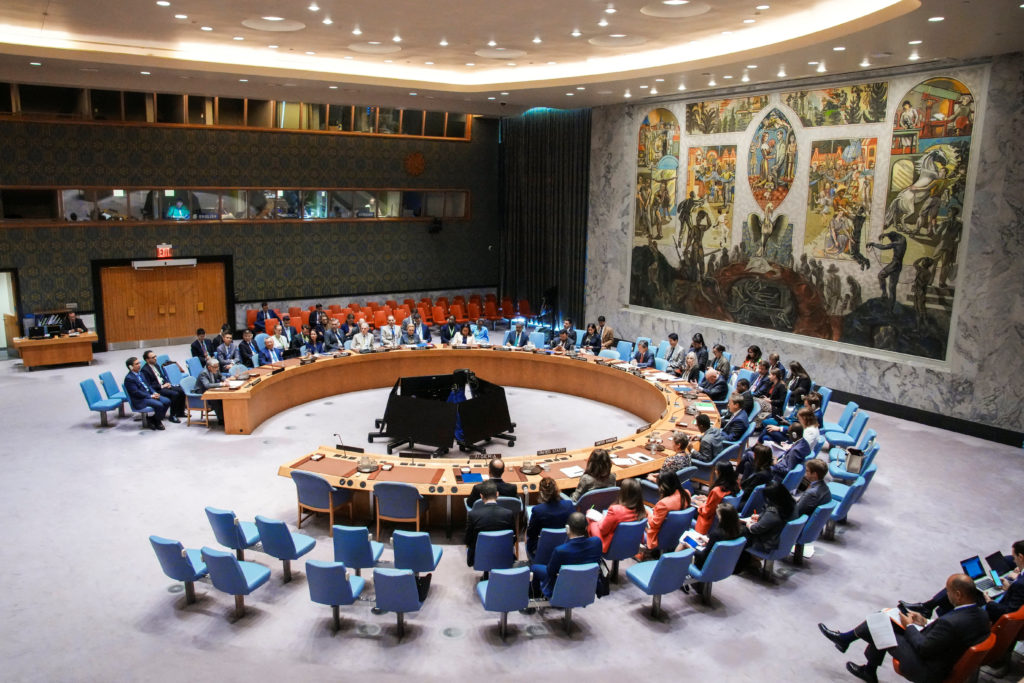
UN Security Council prepares for a crucial vote on sanctions against Iran amid diplomatic deadlock. Image credit PBS
(The Post News) – A desperate Russian attempt to delay the snapback of sweeping United Nations sanctions on Iran will fail at the UN Security Council on Friday, as European countries rejected Tehran’s eleventh-hour offers of partial cooperation on its nuclear programme.
Russia and China will bring forward a draft resolution calling for the six-month suspension of sanctions, but Western diplomats say it will not pass. The move follows the UK, France, and Germany, the European Troika, which pushed for sanctions to return after accusing Iran of breaking the 2015 nuclear agreement.
Iran’s Last Minute Offer Rejected
In a week of high-pressure negotiations, Iranian Foreign Minister Abbas Araghchi proposed allowing International Atomic Energy Agency inspectors to visit only one of several bombed nuclear sites. Tehran also committed to providing a 45-day plan on how it would handle its 400kg stockpile of highly enriched uranium. Iran demanded in return the permanent elimination of the spectre of the reinstatement of UN sanctions.
European diplomats spurned the proposal as inadequate. “The Iranian foreign ministry thought we were bluffing on this, but they never made an actual proposal. Araghchi overestimated this so tremendously,” a European official told reporters.
The sanctions, set to take effect at 00:00 GMT on Saturday, would restore sanctions lifted under the 2015 nuclear pact. They include: A global arms embargo on Tehran, flight bans and freezes on Iranian individuals and groups. Limitations on the export of materials used in uranium enrichment, reprocessing, and missile manufacture.
If it’s triggered, the snapback would further ostracise Iran and increase tensions across the Middle East.
Moscow argues that sanctions would close the door to diplomacy and has proposed a delay until April 2026. “This is about giving diplomacy a chance,” said one Russian envoy. Previous Russian attempts to secure support for a delay received only four votes.
Diplomats expect a few abstentions in Friday’s ballot, but not enough votes for the resolution to pass the nine-vote threshold. Britain, France, and the United States also expect to veto if necessary.
The crisis has also drawn criticism from IAEA Director-General Rafael Grossi. European diplomats hold him responsible for striking a weak deal in Cairo with Tehran last month that they claim allowed Iran to stall on meaningful talks. Others accuse Grossi of positioning himself to make his candidacy stronger for the post of UN secretary-general.
Iran, in turn, has threatened to stop collaborating with the IAEA if sanctions are reinstated. Araghchi stated in a Telegram statement: “The agreement reached last week with the IAEA will be valid only if there is no hostile measure taken against Iran. Otherwise, the Islamic Republic will consider its commitments null and void.
Western diplomats worry the threatened sanctions would encourage Iranian hardliners to do their worst, potentially pushing parliament to withdraw from the Nuclear Non-Proliferation Treaty in its entirety. That would heighten fears of an Israeli military strike.
Iranian President Masoud Pezeshkian, speaking in his first UN General Assembly address this week, said the country would not build a nuclear bomb in a religious decree by Supreme Leader Ayatollah Ali Khamenei. Israel and Western countries are extremely doubtful, however, due to Iran’s advanced nuclear status.
Europe Blames Tehran, Iran Blames the West
Tehran accused the European Troika of caving to U.S. pressure. After meeting with UK Foreign Secretary Yvette Cooper on Thursday, Araghchi termed the European stance as “unjustified, illegal, and irresponsible.”
European diplomats respond that Iran has never made serious offers. “Iran missed its chance,” one official said.
While everybody expects the Russian-Chinese settlement to break down, diplomats maintain that there are still channels of negotiation open. But, snapback can initiate a perilous spin, restricting space for discussion and increasing prospects for armed confrontation.
“The risk is not just diplomatic gridlock,” cautioned a Western diplomat, “but escalation that could destabilize the region as a whole.”



